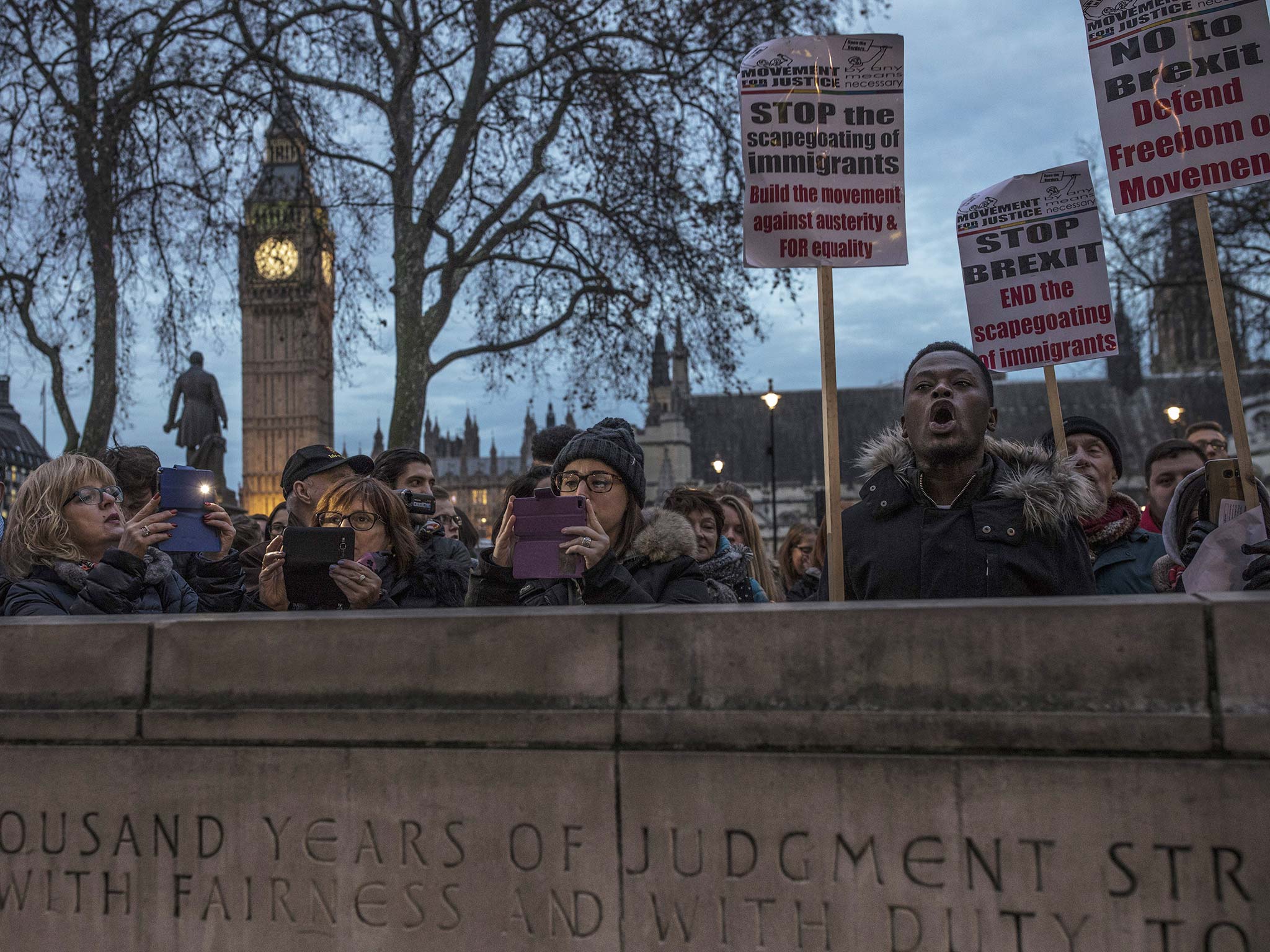If you're as worried as I am about spending Christmas with your Brexit-voting relatives, here are some helpful tips
Resist the urge to talk about your stolen future


You may have managed to avoid those difficult political conversations with your loved ones so far in 2016. But in just under three weeks will be the real test.
As you prepare to settle down to your Christmas dinner with the family, it’s likely there will be at least one Leave voter – a secret, or not-so-secret Brexiteer – at the table, who may be inclined to bring up the EU referendum in reflection of the year’s events.
Your anger may have temporarily subsided, but guaranteed upon the first mention of “those bloody EU bureaucrats”, the resentment you felt after the result will bubble up to the surface once more.
This time your adversaries won’t be those wrinkly, nameless baby-boomers holding “I want my country back” placards, seen in news images that you have come to associate with Leave voters.
No – now they are your nearest and dearest.
But fear not! If you want to eat, drink and be merry – or at least get through the day unscathed – follow this five step guide to surviving the Christmas dinner conversation with your Brexit-loving family:
Resist the urge to talk about your stolen future
No one can choose their family – so remember to be civil. Though it would ordinarily be permissible to launch into a Twitter tirade at the comment “Your generation are so entitled”, it’s important to keep in mind that no one will win if Christmas dinner descends into carnage.
The biggest issue with the polarisation of opinion concerning the referendum is the deep animosity on either side for the other. Many Leave voters presume that Remainers consider them racist bigots, which will always get in the way of ensuring you get your point across – no matter how eloquent it is (or how long you worked on it).
Firstly, ask if it’s possible to keep politics away from the dinner table. You haven’t managed to change your relative’s opinions since June; it’s unlikely you will manage to swing them in the brief two hours you spend with everyone together hunched over your roast.
Failing that, attempt to communicate that you don’t agree with their opinions and you would prefer them to keep controversial views quiet in front of you.
If sly comments do slip through, attempt to keep it light-hearted. Try to keep it less “You’ve stolen my future” and more along the lines of “Your holiday to Spain will cost way more now”.
Find an ally
Failing the democratic approach, the next best thing is having a likeminded individual who can share your offence (or at least see reason) when delicate issues are raised. As likely as it is that you will have someone at the dinner table who voted Leave, it’s nearly as likely that someone will have voted Remain. This person will ideally be as opposed to your family’s more off-colour views as you are – and be willing to argue your corner if you find yourself suddenly outnumbered.
A pre-emptive strike may be necessary. If you aren’t sure of a particular family member’s political opinion test the water beforehand by asking them with comments like: “Nigel Farage nominated for Person of the Year, eh?” or, “What do you reckon about Theresa May’s chances at the Supreme Court?”
Failing that, and if, like mine, all of your relatives have social media accounts, go check their Facebook walls and Twitter feeds for evidence.
In the worst case scenario, pick the person you know has the least racist extreme opinions, so you can side-eye them when the more hardcore statements come out later in the game.
Find common ground, even if it’s bad common ground
Finding common ground can be surprisingly easy – even if the only thing you really agree on is how much you disagree with each other.
My dad sadly muttered towards the end of one heated debate not long after the referendum result, “I think this is the most something has divided families since the miners’ strike” – reminding me that in his youth, brothers would fight in the pub over support of the unions.
You’ll find that no matter how offensive the opposing opinions are to you, in some way or another Leave voters believe they are doing what is best for this country. You might think they are being selfish, but your older relatives probably voted the way they did in the misguided belief that they were helping your future, not their own. Despite the fact you may not have the same lifestyles now, you have similar backgrounds and you can use this to your advantage.
If you’re going to be petty, get your facts right
Revision is key.
I’ve been caught out before when being given a very standard comment on how “you never hear people speak English in St Helens anymore.” Unfortunately, with no retort, all I could really say is “That’s not true” and, without any evidence, I was then forced to back down five minutes later.
If I’d have looked up demographics quickly beforehand, I’d have found that in a 2011 census, 98.8 per cent of people living in St Helens speak English as a first language. 95.5 per cent of people who live there were born in England, with the largest minorities coming from Scotland (0.6 per cent) and Wales (0.5 per cent.)
Any mentions of the “Islamification” of St. Helens could have also been shut down with handy information from the same census, which showed there were around 40 more people who registered as a “Jedi Knights” than registered as Muslims. If you’re going to be petty, a quick pre-dinner Google could save your bacon.
Here are some quick myth busters on some of the most likely quotes you’ll hear at the table about the referendum:
“Immigrants are taking all our jobs”
In a small town like St Helens, this is very easy to argue about, because these kinds of small industrial northern towns still have relatively low levels of immigration and unemployment tends to be the result of a lot of wider issues (such as Government cuts, advancements in technology and lack of investment in the area.) However, if you’re from a bigger city, it’s slightly more difficult to argue against.
A really good point to bring up is that immigration actually creates jobs. According to a report earlier this year by the International Longevity think tank, areas with high employment rates for immigrants tended to have a higher UK-born population in work. In addition, due to the falling birth rate among white British people, the tax paid from migrants from the European Economic Area (totalling around £22.1bn) will go towards supporting our ageing population.
“The EU is undemocratic”
Much harder to disagree with.
The political structure of European Union is complex, and difficult to communicate in a few sentences during a debate. The easiest way to argue this point is by highlighting our very own, very similar political structure – and the existence of the House of Lords.
While it’s true the European Commission is made up of unelected civil servants (much like Lords) from all EU member states, the commission’s role is only to propose laws and legislations, which then have to be approved by both the European Parliament and the European Council.
The Parliament is made up of MEPs who are democratically elected – by us – every five years. The largest political party within the European Council, currently the European People Party, then installs the President of the European Commission (currently Jean-Claude Junker). The European Council is made up of the heads of states of all 28 member states, who themselves have been democratically elected on a national level.
“Leaving the EU will save money”
Much easier.
British taxpayers will face £27bn in losses from bailing out some of the largest banks during the share price drop in the wake of the vote to leave the EU, according to the Office of Budget Responsibility. In 2015 the UK government paid £13bn to the EU budget, and EU spending on the UK was £4.5bn – Britain’s 2016 contribution is set to be even less due to a “rebate” worth almost £5bn a year.
Know when to give up
Even after you have followed the excellent advice in this article, you might still reach a startling realisation: you aren’t going to change your family’s opinions.
As someone who hasn’t lived in the North West since I was a teenager, I am now seen by my own parents as a member of a group they don’t trust: the liberal elite.
In contrast, as someone who lives in London and is surrounded by liberal viewpoints, and as someone who curates social media so all that can be seen is a filtered view of the world that I generally agree with, I will be more inclined to believe that what they are saying is false, and be unable to see things comprehensively from their perspectives.
No matter how much you want your loved ones to agree with you, attempting to force your own opinion upon them is only going to alienate them further. Be understanding, and remember: you’re not the only household in Britain that will be debating on Christmas Day.
Join our commenting forum
Join thought-provoking conversations, follow other Independent readers and see their replies
Comments